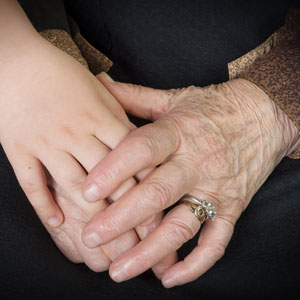 If you’re a caregiver, you know that taking care of someone who needs your assistance can be very rewarding. Being there for your loved ones when they need you is a core value for many. But being a caregiver can exact a high toll, and caregiver stress is common.
If you’re a caregiver, you know that taking care of someone who needs your assistance can be very rewarding. Being there for your loved ones when they need you is a core value for many. But being a caregiver can exact a high toll, and caregiver stress is common.
Caregiver stress is the emotional and physical strain of caregiving. Individuals who experience the most caregiver stress are the most vulnerable to changes in their own health.
Many caregivers fall into the trap of believing that they have to do everything by themselves. Don’t make that mistake. Take advantage of the many resources and tools available to help you provide care for your loved one. Remember, if you don’t take care of yourself you won’t be able to care for anyone else.
Signs of caregiver stress
As a caregiver, you may be so focused on your loved one that you don’t realize that your own health and well-being are suffering. Watch for these signs of caregiver stress:
- Feeling tired most of the time
- Feeling overwhelmed and irritable
- Sleeping too much or too little
- Gaining or losing a lot of weight
- Losing interest in activities you used to enjoy
Too much stress, especially over a long time, can harm your health. As a caregiver, you’re more likely to experience symptoms of depression or anxiety. In addition, you may not get enough physical activity or eat a balanced diet, which only increases your risk of medical problems, such as heart disease and diabetes.
Strategies for dealing with caregiver stress
The emotional and physical demands involved with caregiving can strain even the most resilient person. That’s why it’s so important to take advantage of available help and support. These strategies have helped others manage their caregiver stress:
- Accept help. Be prepared with a list of ways that others can help you, and let the helper choose what he or she would like to do. For instance, one person might be willing to take the person you care for on a walk a couple of times a week. Someone else might offer to pick up groceries or even to cook for you.
- Focus on what you are able to provide. Don’t give in to guilt. Feeling guilty is normal, but understand that no one is a “perfect” caregiver. You’re doing the best you can at any given time. Your house does not have to be perfect, and no one will care if you eat leftovers three days in a row. And you don’t have to feel guilty about asking for help.
- Get connected. Organizations such as the Red Cross and the Alzheimer’s Association offer classes on caregiving, and local hospitals may have classes specifically about the disease your loved one is facing.
- Join a support group. A support group can be a great source for encouragement and advice from others in similar situations. It can also be a good place to make new friends.